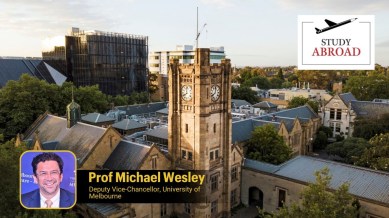Deeksha Teri covers education and has worked with the The Hindu (print division), WION and Stonebow Media. She is an alumnus of The University of Lincoln and The University of Delhi. ... Read More
© IE Online Media Services Pvt Ltd

The University of Melbourne Tuesday inaugurated a global centre in New Delhi to enhance partnerships and engagement with local students, alumni, government officials, and educational partners.
The Melbourne Global Centre is not designed for teaching or as an offshore campus. It will act as a bridge between Indian students and Australia. The centre will house an official from the university who will be responsible for clearing all doubts that prospective Indian students might have related to admission to the University of Melbourne.
The varsity also shared news of developing talks with JNU about a joint PhD. However, the details are yet to be finalised.
Professor Michael Wesley, Deputy Vice-Chancellor (Global, Culture and Engagement), University of Melbourne talks to indianexpress.com about the varsity’s plans to open an offshore campus in India, the recent international student cap by the Australian government and more. Some excerpts from the interview…
Like the University of Wollongong and Deakin, is UoM also planning to launch an Indian campus, as per UGC’s new initiative?
The University of Melbourne has no plans to open a campus overseas or offshore. But what our global centre enables us to do is to expand our collaboration with Indian universities and expand the provision of education through existing Indian universities. With several Indian universities, we have been developing new ways of teaching, like Bachelor of Science, Bachelor of Education, and other courses.
What is the university’s Stance on the Cap on international students?
The university opposes the cap, we think it is a bad policy, but we are not the only ones who think like that. There is a range of voices from within Australia — universities, business groups, economists, accommodation providers and tourism industry who say that it’s not a good policy. So, we are preparing to comply with it, but I am hoping that the cap will be a short run thing because the folly of this policy will become apparent to the government.
The cap on international students will have detrimental consequences for our University, the higher education sector generally, and the nation for years to come. The effects will be felt by students and staff, in terms of inadequate funding to teach and do research, and by industry partners, and there will also be negative effects on the broader economy.
Importantly, the proposed caps do not currently apply to our students already enrolled in our graduate degrees, or students currently studying an undergraduate degree at the University and who intend to progress directly to a graduate degree here.
What is the new global centre that has been launched today?
The University of Melbourne Global Centre is a multifunctional space located in New Delhi. The Global Centre allows to showcase the richness and diversity of what we do at the University of Melbourne to a broad section of Indian society. Whether it’s a guest lecture, symposia, professional development or student exchange, it provides us with the ability to engage constantly with Indian society, facilitating the exchange of ideas between India and Melbourne.
Which courses will this global centre offer, and how will the admissions and certifications take place? Would you provide placement as it is a common culture in the India varsities?
This centre is our physical presence in-country, but not a teaching campus. It will not offer any award teaching that results in university degrees, but it will offer non-award trainings like professional development or skill enhancement programmes for students. It will provide training to individuals aiming to upgrade their skills in particular areas for example, it could offer training to civil servants on various topics and methods. Additionally, it will facilitate student exchanges.
The University of Melbourne has no plans to open a campus overseas or offshore.
One of the most promising opportunities the global centre offers is the prospect of bringing the university of Melbourne students to Delhi and helping them connect with students from Indian universities to do joint projects and workshops. This will promote meaningful interactions between Australian and Indian students.
How has the Indian diaspora at Melbourne University changed over the years?
We value our Indians students, they invariably become deeply involved in campus life, student clubs and societies as well, as representative bodies. They are vibrant contributors to campus life. For how things have changed over the year, I think they have grown in number, and we would love to see more Indian students at the University of Melbourne. They socialise very well and make long-term friendships.
It is often said that finding accommodation in Australia is one of the toughest tasks for international students. Does Melbourne University provide on-campus accommodation, and/or support for finding places?
We have some on-campus accommodation at the university, but there’s a lot more off-campus accommodation, particularly purpose-built student accommodation and we certainly are prepared to help students to find accommodation.
There is no difficulty in finding accommodation in Melbourne. In fact, there is an oversupply of student accommodation in the city and we keep a very close eye on that. We are more than happy to help students find access to the appropriate accommodation.
Is Melbourne University planning to launch any new scholarships to attract Indian students?
We are working on some new scholarships to attract Indian students, and we hope to announce that in the coming months.